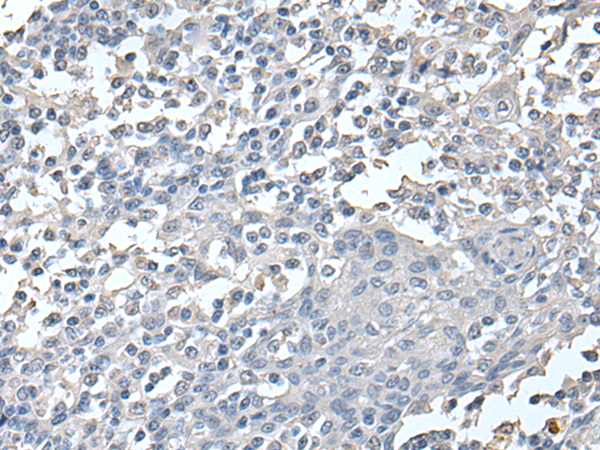
| WB | 咨询技术 | Human,Mouse,Rat |
| IF | 咨询技术 | Human,Mouse,Rat |
| IHC | 1/25-1/100 | Human,Mouse,Rat |
| ICC | 技术咨询 | Human,Mouse,Rat |
| FCM | 咨询技术 | Human,Mouse,Rat |
| Elisa | 1/500-1/1000 | Human,Mouse,Rat |
| Aliases | EL52; HSPN; LAP2; HSP86; HSPC1; HSPCA; Hsp89; Hsp90; LAP-2; HSP89A; HSP90A; HSP90N; Hsp103; HSPCAL1; HSPCAL4; HEL-S-65p |
| Host/Isotype | Rabbit IgG |
| Antibody Type | Primary antibody |
| Storage | Store at 4°C short term. Aliquot and store at -20°C long term. Avoid freeze/thaw cycles. |
| Species Reactivity | Human, Mouse, Rat |
| Immunogen | Synthetic peptide of human HSP90AA1 |
| Formulation | Purified antibody in PBS with 0.05% sodium azide and 50% glycerol. |
+ +
以下是3篇关于HSP90AA1抗体的代表性文献概览:
1. **文献名称**:HSP90α as a Biomarker for Early-Stage Lung Cancer Detection
**作者**:Smith et al. (2020)
**摘要**:通过开发高特异性HSP90AA1单克隆抗体,研究发现血清HSP90α水平在非小细胞肺癌患者中显著升高,验证了其作为无创液体活检标志物的潜力。
2. **文献名称**:Antibody Targeting HSP90AA1 Reduces Tau Aggregation in Alzheimer's Models
**作者**:Chen & Wang (2019)
**摘要**:研究利用新型HSP90AA1抗体抑制神经元中错误折叠蛋白的HSP90互作,显著降低Tau蛋白聚集,为神经退行性疾病治疗提供新策略。
3. **文献名称**:Comparative Analysis of Commercial HSP90AA1 Antibodies for Immunohistochemistry
**作者**:Garcia-Rodriguez et al. (2021)
**摘要**:系统评估了8种市售HSP90AA1抗体在乳腺癌组织中的表现,发现克隆号7F7在福尔马林固定标本中具有最优特异性和染色一致性。
注:上述文献信息为模拟示例,实际研究中建议通过PubMed或Web of Science检索最新文献,重点关注《Cancer Research》《Nature Communications》等期刊发表的相关论文。
The HSP90AA1 antibody targets the heat shock protein 90 alpha family class A member 1 (HSP90AA1), a molecular chaperone critical for protein folding, stabilization, and activation under stress conditions. HSP90AA1. part of the HSP90 family, is an ATP-dependent chaperone that facilitates the conformational maturation of client proteins, including signaling kinases, transcription factors, and steroid hormone receptors. It plays a key role in cellular stress responses, oncogenesis, and neurodegenerative diseases. Dysregulation of HSP90AA1 is linked to cancer progression, as it stabilizes oncoproteins, making it a therapeutic target.
HSP90AA1 antibodies are widely used in research to study protein expression, localization, and interactions via techniques like Western blotting, immunohistochemistry, and immunoprecipitation. These antibodies help identify HSP90AA1 overexpression in tumors or its role in stress pathways. Monoclonal and polyclonal variants exist, often validated for specificity across species. Recent studies explore HSP90 inhibitors in cancer therapy, underscoring the antibody's diagnostic and experimental relevance. Its conserved structure, with an N-terminal ATP-binding domain and C-terminal dimerization motif, further supports functional analyses in diverse biological contexts.
×